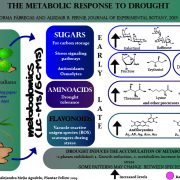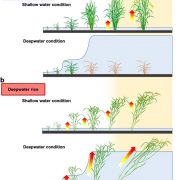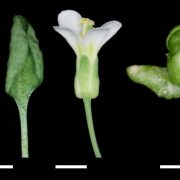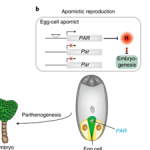Fast and global reorganization of the chloroplast protein biogenesis network during heat acclimation (Plant Cell)
 With the rising climatological extremes, heat stress is a major concern towards sustainable crop yield and productivity as it impairs several physiological and developmental processes. Due to the sessile lifestyle of land plants, they undergo various acclimation responses to cope with fluctuating temperatures. Chloroplasts, apart from being the energy-producing organelles, are also a central player for numerous acclimation responses; hence they are also regarded as the “hub of acclimation”. However, there is very limited understanding about the regulatory mechanisms responsible for heat acclimation of chloroplasts. Trösch et al. revealed an altered pattern of plastid protein biosynthesis and translation elongation as the major heat acclimation processes through time-resolved transcript and ribosome profiling. The authors highlight that these acclimation responses are conserved between Chlamydomonas and tobacco. The authors have also identified certain ribosome-associated factors suggesting that the co-translational action of these factors might be crucial for heat acclimation. Further investigation will be required to elucidate the detailed mechanism underlying co-translational processes during heat acclimation. (Summary by Prakshi Aneja @PrakshiAneja) Plant Cell 10.1093/plcell/koab317
With the rising climatological extremes, heat stress is a major concern towards sustainable crop yield and productivity as it impairs several physiological and developmental processes. Due to the sessile lifestyle of land plants, they undergo various acclimation responses to cope with fluctuating temperatures. Chloroplasts, apart from being the energy-producing organelles, are also a central player for numerous acclimation responses; hence they are also regarded as the “hub of acclimation”. However, there is very limited understanding about the regulatory mechanisms responsible for heat acclimation of chloroplasts. Trösch et al. revealed an altered pattern of plastid protein biosynthesis and translation elongation as the major heat acclimation processes through time-resolved transcript and ribosome profiling. The authors highlight that these acclimation responses are conserved between Chlamydomonas and tobacco. The authors have also identified certain ribosome-associated factors suggesting that the co-translational action of these factors might be crucial for heat acclimation. Further investigation will be required to elucidate the detailed mechanism underlying co-translational processes during heat acclimation. (Summary by Prakshi Aneja @PrakshiAneja) Plant Cell 10.1093/plcell/koab317









